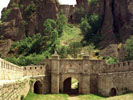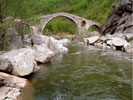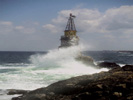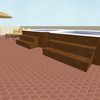2.4.2008 | 13:57
Bulgaria history
History:
 The territory of modern Bulgaria is among the earliest populated territories in the history of Europe – the first inhabitants date back to Neolithic era.
The territory of modern Bulgaria is among the earliest populated territories in the history of Europe – the first inhabitants date back to Neolithic era.
The Thracians settled down here around 3 500 BC. Throughout centuries Thracians, as well as Romans, proto-Bulgarians, Slavs, Greeks and Turks have inhabited the territory of modern Bulgaria and have contributed to the formation of its unique traditions and culture.
The gold Thracian treasures ( the Varna gold treasure is the oldest one in the world), The Slav alphabet (created in the 9th century by the brothers Kiril and Metodi), the miniatures in the gospel of Tsar Ivan Alexander (kept in the British Museum in London) represent a small part of the country’s contribution to European culture and world civilization. Nine sites in Bulgaria are included in UNESCO’s World Heritage list.
Bulgaria dates back 1300 years (founded in 681 by Khan Asparuh) and it is among the most ancient countries in Europe. Bulgarian history keeps the memory of great rulers. Under Khan Krum’s rule (803-814), Bulgaria’s boundaries reached as far as the Empire of Carl the Great to the West, Constantinople – the capital of the Byzantine Empire to the East. In 864, during the reign of Tsar Boris I Michail, Bulgarians accept Christianity as an official religion. The name of Tsar Simeon I (893- 927) is usually associated with the “Golden Century of Bulgarian Culture”. In addition, the territory of the country was expanded as far as the Black and Aegean seas. The Second Bulgarian Kingdom was founded in 1186 after the uprising of the boyars Assen and Petar and it is a successful completion of approximately two centuries struggles for liberation from Byzantine influence.
 In 1396, the seven centuries old country was conquered by the Ottoman Empire and spent 500 years under its rule. That period is associated with the formation of the Bulgarian nation and development of educational traditions. A major inspiration for the process is the work of the Hilendar monk Paisii Hilendarski “History of Slavs and Bulgarians”, written in 1762.
In 1396, the seven centuries old country was conquered by the Ottoman Empire and spent 500 years under its rule. That period is associated with the formation of the Bulgarian nation and development of educational traditions. A major inspiration for the process is the work of the Hilendar monk Paisii Hilendarski “History of Slavs and Bulgarians”, written in 1762.
The major figures in the movement for liberation are Georgi Sava Rakovski – a writer and a journalist; Vassil Levski – author of the strategy and ideology of the struggles; Ljuben Karavelov - a writer and a journalist, leader and ideologist; Hristo Botev – a poet and a journalist, a revolutionary and national hero.
In 1876 the April uprising broke out - the first organized attempt for liberation. The uprising is brutally suppressed but the bloodshed compelled the attention of the European countries. In 1978, as a result from the Rusian-Turkish wars (1877-1878), the Bulgarian state is restored, but its territory is divided between Kingdom Bulgaria, governed by Prince Alexander Batenberg, East Rumelia, governed by the general- governor Alexander Bogoridi and Thracia and Macedonia, which remained under Ottoman rule.
 During the Second World War, king Boris III supported the public opinion and did not permit the deportation of 50 000 Jews from the country.
During the Second World War, king Boris III supported the public opinion and did not permit the deportation of 50 000 Jews from the country.
On November 10, 1989, came the end of the communist rule which was established in 1944-45 and irreversible changes have been taking part in the country ever since. A new Constitution was accepted (1991), political parties were restored; nationalized properties were given back to their rightful owners.
Bulgaria became a member of NATO on 29th March, 2004, and on January 1st, 2007, the country became a member of the European Union.








 kolgrimur
kolgrimur
 the-consultant
the-consultant
 prakkarinn
prakkarinn
 killjoker
killjoker
 halkatla
halkatla
 palmig
palmig
 saxi
saxi
 glauga
glauga
 vilhelmina
vilhelmina
 zeriaph
zeriaph
 arnaeinars
arnaeinars
 almaogfreyja
almaogfreyja
 gattin
gattin
 gudrunss
gudrunss
Athugasemdir
http://kolgrimur.blog.is/blog/kolgrimur/
Hlynur Jón Michelsen, 6.4.2008 kl. 04:15
Bęta viš athugasemd [Innskrįning]
Ekki er lengur hęgt aš skrifa athugasemdir viš fęrsluna, žar sem tķmamörk į athugasemdir eru lišin.